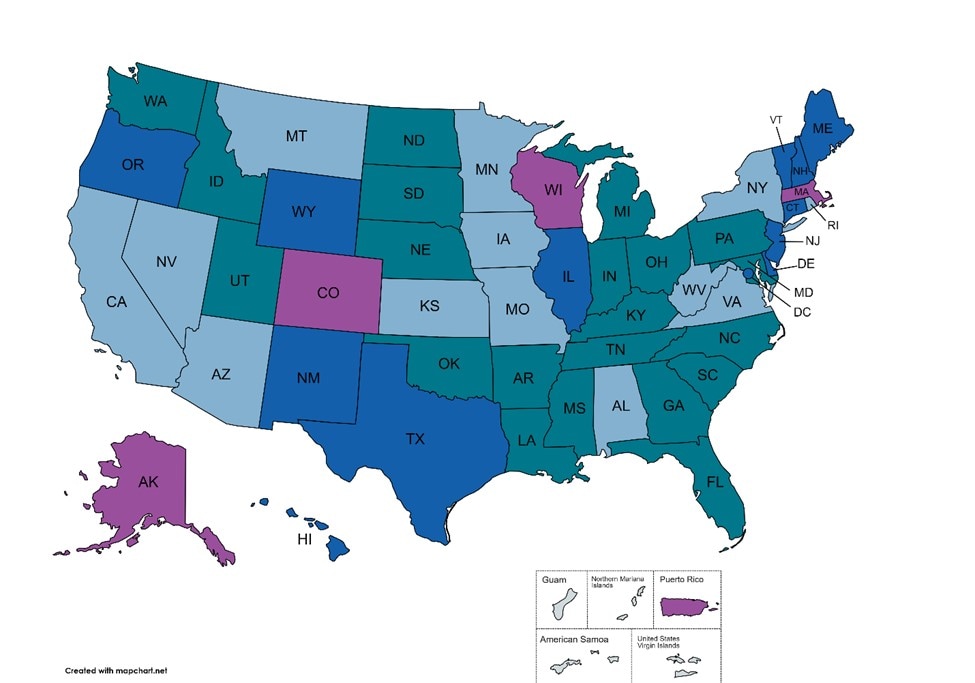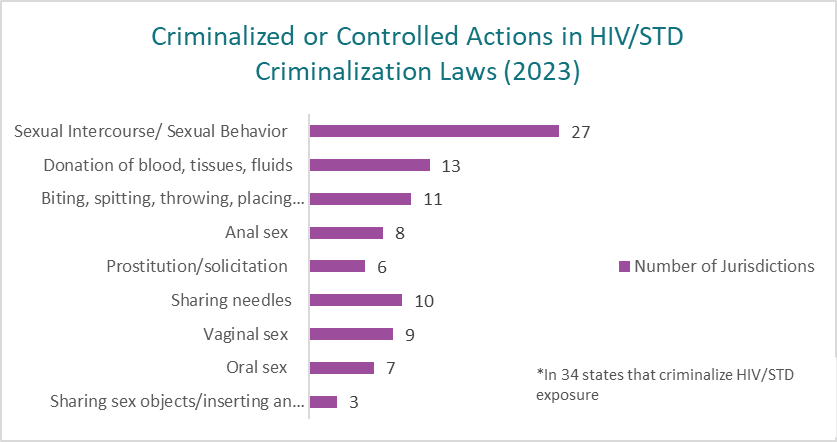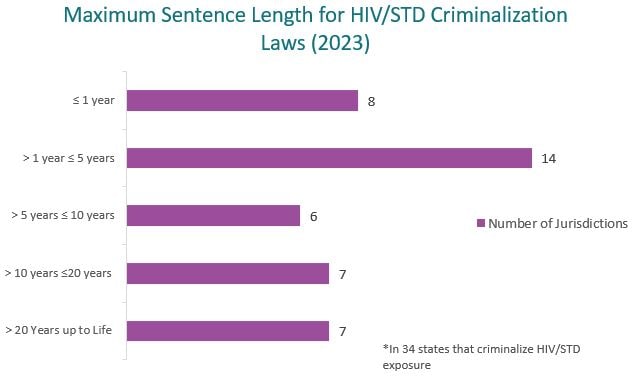HIV and STD Criminalization Laws
Updated December 19, 2023
As of 2023, 34 states have laws that criminalize HIV exposure.
CDC researched and analyzed the relevant laws for the 50 states, the District of Columbia, and Puerto Rico then categorized them into four categories.
- HIV-specific laws that criminalize or control behaviors that can potentially expose another person to HIV.
- Sexually transmitted disease (STD), communicable, contagious, infectious disease (STD/communicable/infectious disease) laws that criminalize or control behaviors that can potentially expose another person to STDs/communicable/infectious disease. This might include HIV.
- Sentence enhancement laws specific to HIV, or STD that do not criminalize a behavior but increase the sentence length when a person with HIV commits certain crimes.
- No specific criminalization laws.
General criminal statutes, such as reckless endangerment and attempted murder, can be used to criminalize behaviors that can potentially expose another to HIV and or an STD. Many states have laws that fall into more than one of the categories listed above. For this analysis, only HIV-specific laws are captured for states with both HIV-specific laws and STD/communicable/infectious disease laws. Only HIV or STD/communicable/infectious disease laws are captured for states with both HIV or STD/communicable/infectious disease laws and sentence enhancement statutes.
During the early years of the HIV epidemic, many states implemented HIV-specific criminal exposure laws to discourage behavior that might lead to transmission, promote safer sex practices, and, in some cases, receive funds to support HIV prevention activities. These laws were passed at a time when very little was known about HIV including how HIV was transmitted and how best to treat the virus. Many of these state laws criminalize behaviors that cannot transmit HIV – such as biting or spitting – and apply regardless of actual transmission, or intent. After over 30 years of HIV research and significant biomedical advancements to treat and prevent HIV transmission, many state laws are now outdated and do not reflect our current understanding of HIV. In many cases, this same standard is not applied to other treatable diseases. Further, these laws have been shown to increase stigma, exacerbate disparities, and may discourage HIV testing.
HIV and STD Criminalization Laws 2023


Criminalize or Control Actions Through HIV-Specific Statutes and Regulations (n=21)

Criminalize or Control Actions Through STD/Communicable/Infectious Diseases Specific Statutes (n=13)

Sentence Enhancement Statutes (n=5)

None/General Criminal Statutes (n=13)
Criminalization of potential HIV exposure is largely a matter of state law, with some Federal legislation addressing criminalization in discrete areas, such as blood donation and prostitution. These laws vary as to what behaviors are criminalized or what behaviors result in additional penalties. Several states criminalize one or more behaviors that pose a low or negligible risk for HIV transmission.

In 13 states, laws require people with HIV who are aware of their status to disclose their status to sex partners, and 4 states require disclosure to needle-sharing partners.
The maximum sentence length for violating an HIV-specific statute is also a matter of state law. Some states have a maximum sentence length up to life in prison, while others have maximum sentence lengths that are less than 10 years. However, only 10 states have laws that account for HIV prevention measures, such as condom use, antiretroviral therapy (ART), and pre-exposure prophylaxis (PrEP) use.

Since 2014, at least thirteen states have modernized or repealed their HIV criminal laws: California, Colorado, Georgia, Illinois, Iowa, Michigan, Missouri, Nevada, New Jersey, North Carolina, Virginia, and Washington. Changes include moving HIV prevention issues from the criminal code to disease control regulations, requiring intent to transmit, actual HIV transmission, or providing defenses for taking measures to prevent transmission, including viral suppression or being noninfectious, condom use, and partner PrEP use.
Resources
HIV Criminalization Legal and Policy Assessment Tool
CDC in collaboration with ChangeLab Solutions developed a HIV criminalization legal and policy assessment tool to assist jurisdictions in evaluating their laws to ensure they align with current scientific and medical evidence. This tool aims to help public health professionals, policymakers, legal counsel, and partners understand how HIV criminalization laws intersect with data privacy laws in their jurisdictions and to facilitate conversations among partners.
CDC is also collaborating with ChangeLab Solutions to establish a learning lab to help states apply the HIV criminalization legal and policy assessment tool.
Background on HIV Criminalization in the United States
The following resources from the Center for HIV Law and Policy provide a broad overview of HIV criminalization in the United States. Specifically, these resources address the science of HIV, provide background literature on the history and practices of HIV criminalization, and the current status of HIV criminalization laws and statutes in the United States.
Case Studies
The following case studies provide an in-depth analysis of the HIV criminalization laws, practices, convictions, and sentencing outcomes in a variety of states.
The Williams Institute: State Case Studies:
- Enforcement of HIV Criminalization in Arkansas – September 2023
- Enforcement of HIV Criminalization in Louisiana | September 2022 | Louisiana
- HIV Criminalization in Tennessee: Enforcement of HIV Criminalization in Tennessee | June 2022 | Tennessee
- Enforcement of HIV Criminalization in Kentucky | December 2021| Kentucky
- Enforcement of HIV Criminal Laws in Virginia | December 2021 | Virginia
- HIV Criminalization in Florida: Length of Incarceration and Fiscal Implications | July 2021 | Florida
- HIV Criminalization in Georgia: Length of Incarceration and Fiscal Implications | June 2021 | Georgia
- Enforcement of HIV Criminalization in Nevada | May 2021 | Nevada
- HIV Criminalization in California: Evaluation of Transmission Risk | December 2016 | California
- HIV Criminalization in Florida Evaluation of Transmission Risk | February 2020 | Florida
- HIV Criminalization in Georgia | January 2018 | Georgia
- HIV Criminalization in Florida | October 2018 | Florida
- The Criminalization of HIV and Hepatitis B and C in Missouri, An Analysis of Enforcement Data from 1990 to 2019 | February 2020 | Missouri
Federal Guidance
The current federal guidance from the U.S. Department of Justice on HIV criminalization practices and reform is provided below.
- Department of Justice: Best Practices Guide to Reform HIV Specific Criminal Laws to Align with Scientifically Supported Factors
Scientific and Legal Research
The following resources represent a sample of articles from the legal and scientific research communities.
- Mermin J., Salvant Valentine S., McCray E. (2021). HIV Criminalization laws and ending the US HIV epidemic. TheLancet,8(1), E4-E6. Retrieved from https://doi.org/10.1016/S2352-3018(20)30333-7.
- Baugherm A. R., Whiteman A., Jeffries W. L., Finlayson T., Lewis R., Wejnert C. (2017). Black men who have sex with men living in states with HIV Criminalization laws report high stigma. AIDS,35(10), 1637-1645. Retrieved from https://pubmed.ncbi.nlm.nih.gov/34270489/.
- Sweeney P., Gray S., Purcell D., Sewell J., Babu A., Tarver B., Mermin J. (2017). Association of HIV diagnosis rates and laws criminalizing HIV exposure in the United States. AIDS,31(10), 1483-1488. Retrieved from https://www.ncbi.nlm.nih.gov/pubmed/28398957.
- Lehman J. S., Carr M. H., Nichol A. J., Ruisanchez A., Knight D. W., Langford A. E., Mermin J. H. (2014). Prevalence and public health implications of state laws that criminalize potential HIV exposure in the United States. AIDS and behavior, 18(6), 997–1006. Retrieved from https://www.ncbi.nlm.nih.gov/pmc/articles/PMC4019819/
- Barré-Sinoussi F., Abdool Karim S. S., Albert J., Bekker L. G., Beyrer C., Cahn P., Godfrey-Faussett P. (2018). Expert consensus statement on the science of HIV in the context of criminal law. Journal of the International AIDS Society, 21(7), Retrieved from https://www.ncbi.nlm.nih.gov/pubmed/30044059
- Harsono Dini. Bibliography on criminalization of HIV non-disclosure, exposure, and transmission. New Haven, CT: Center for Interdisciplinary Research on AIDS at Yale University; 2018. Retrieved from https://cira.yale.edu/sites/default/files/Criminalization%20of%20HIV%20Bibliography%20Aug%202018.pdf
The information presented here does not constitute legal advice and does not represent the legal views of the Centers for Disease Control and Prevention or the Department of Health and Human Services, nor is it a comprehensive analysis of all legal provisions relevant to HIV. This information is subject to change and does not contain measures implemented by counties, cities, or other localities. Use of any provision herein should be contemplated only in conjunction with advice from legal counsel.